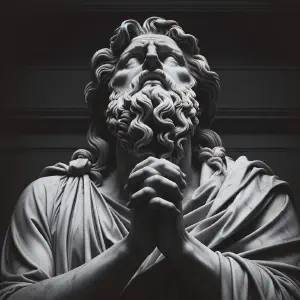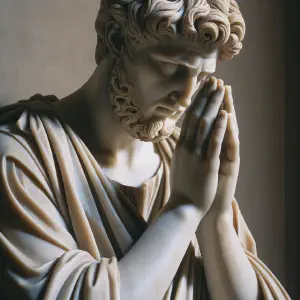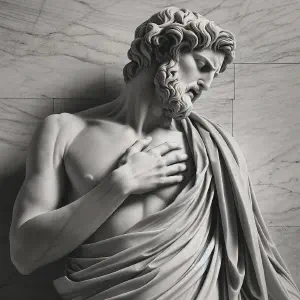Elijah's Fire: A Prophetic Journey
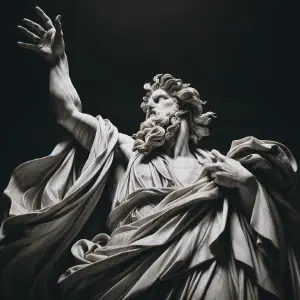
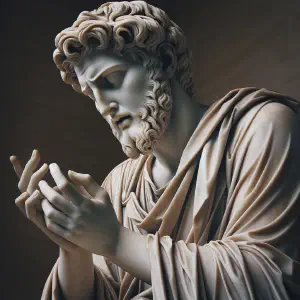

Descending from a mountaintop encounter with the divine, Jesus’ disciples pondered the words of the scribes, questioning the role of Elijah in the grand tapestry of salvation. Jesus, with wisdom that pierced the veils of time and prophecy, revealed that Elijah’s spirit had indeed returned, embodied in John the Baptist, a herald of change and restoration. Yet, like Elijah, John faced rejection and suffering, a foreshadowing of the path that Jesus, the Son of Man, would tread. In this revelation, the disciples understood the profound connection between the prophets of old and the unfolding story of salvation, a narrative of divine love, sacrifice, and redemption.
Five Questions
What is the significance of Elijah’s actions in the Book of Sirach, particularly his ability to control elements like fire and rain?
Elijah’s actions signify the power of God working through a prophet. His control over the elements, like calling down fire from heaven and shutting the heavens to stop rain, symbolizes God’s sovereignty over nature and His ability to intervene in human affairs. These actions also represent divine judgement and purification, reminding us of the need for repentance and obedience to God’s will.
How does Psalm 80 connect with the theme of divine intervention and guidance highlighted in the Elijah story?
Psalm 80 beautifully complements the theme of Elijah’s story by emphasizing the need for God’s guidance and intervention. The Psalmist’s plea for the Shepherd of Israel to shine forth and care for the vine He planted echoes the Israelites’ need for divine leadership and care, which Elijah represented. This Psalm is a cry for salvation and a reminder of God’s role as our protector and savior.
In the context of preparing the way for the Lord, how is John the Baptist’s role linked to Elijah, as mentioned in the Gospel of Matthew?
In Matthew’s Gospel, Jesus explains that John the Baptist embodies the spirit and power of Elijah, fulfilling the prophecy of Elijah’s return before the Messiah. John’s role in preparing the way for the Lord mirrors Elijah’s role as a reformer and prophet. Both called for repentance and prepared the people for a deeper understanding of God’s salvation plan, thus bridging the Old Testament prophecies with their fulfillment in the New Testament.
What does the question of Jesus’ disciples about Elijah signify in terms of understanding prophecy?
The disciples’ question about Elijah signifies a common quest for understanding the fulfillment of biblical prophecy. Their inquiry shows a desire to grasp how prophetic traditions align with the events they were witnessing in Jesus’ ministry. It also highlights a broader theme in Scripture: the continuity between the Old and New Testaments, where prophecies are not just predictions, but part of a divine narrative that unfolds over time.
How do these passages collectively teach us about faith and redemption in our modern context?
Collectively, these passages teach us that faith involves trust in God’s plans, even when they unfold in unexpected ways, just as Elijah’s and John the Baptist’s roles were part of a larger divine plan. They remind us that redemption is an ongoing process, where each person plays a part in God’s salvific history. These scriptures encourage us to seek spiritual renewal, embrace God’s guidance, and remain open to the transformative power of faith in our lives today.
Bible Study
Sirach 48:1-4, 9-11
In those days,
like a fire there appeared the prophet Elijah
whose words were as a flaming furnace.
Their staff of bread he shattered,
in his zeal he reduced them to straits;
By the Lord’s word he shut up the heavens
and three times brought down fire.
How awesome are you, Elijah, in your wondrous deeds!
Whose glory is equal to yours?
You were taken aloft in a whirlwind of fire,
in a chariot with fiery horses.
You were destined, it is written, in time to come
to put an end to wrath before the day of the LORD,
To turn back the hearts of fathers toward their sons,
and to re-establish the tribes of Jacob.
Blessed is he who shall have seen you
and who falls asleep in your friendship.
This passage from Sirach portrays the prophet Elijah as a powerful and zealous servant of God, characterized by his control over natural elements and his fiery words. Elijah, whose life is marked by miracles and confrontations with idolatry, aligns with Catholic values of faithfulness and devotion to God’s commandments. His role in challenging the Israelites to return to true worship and his ascension to heaven prefigure Christian concepts of redemption and the hope of eternal life. The passage reinforces the importance of prophetic voices in guiding the faithful towards truth and righteousness, resonating with Catholic teachings on the role of prophets and the value of divine intervention.
Psalm 80:2ac and 3b, 15-16, 18-19
R. (4) Lord, make us turn to you; let us see your face and we shall be saved.
O shepherd of Israel, hearken,
From your throne upon the cherubim, shine forth.
Rouse your power.
R. Lord, make us turn to you; let us see your face and we shall be saved.
Once again, O LORD of hosts,
look down from heaven, and see;
Take care of this vine,
and protect what your right hand has planted
the son of man whom you yourself made strong.
R. Lord, make us turn to you; let us see your face and we shall be saved.
May your help be with the man of your right hand,
with the son of man whom you yourself made strong.
Then we will no more withdraw from you;
give us new life, and we will call upon your name.
R. Lord, make us turn to you; let us see your face and we shall be saved.
Psalm 80 is a prayerful plea for divine intervention and guidance, reflecting the Catholic values of trust in God and the pursuit of His saving grace. The Psalm’s call for the Shepherd of Israel to ‘shine forth’ illustrates the longing for God’s presence and care, mirroring the role of Christ as the Good Shepherd in Catholic theology. The imagery of God nurturing and protecting His vine, which symbolizes Israel, aligns with the Catholic understanding of God’s continuous care for His people. This Psalm emphasizes the importance of turning to God in times of need, invoking His mercy and grace, themes central to Catholic teachings on prayer and reliance on divine providence.
Matthew 17:9a, 10-13
As they were coming down from the mountain,
the disciples asked Jesus,
“Why do the scribes say that Elijah must come first?”
He said in reply, “Elijah will indeed come and restore all things;
but I tell you that Elijah has already come,
and they did not recognize him but did to him whatever they pleased.
So also will the Son of Man suffer at their hands.”
Then the disciples understood
that he was speaking to them of John the Baptist.
In this Gospel passage, Jesus clarifies the role of Elijah, as represented by John the Baptist, in salvation history. This dialogue highlights Catholic principles of understanding Scripture and the fulfillment of prophecy. John the Baptist, as the forerunner of Christ, embodies the spirit of Elijah by preparing the way for the Lord through preaching repentance. His role aligns with the Catholic view of grace as a preparation for the coming of Christ. Jesus’ explanation underscores the connection between Old Testament prophecies and their fulfillment in the New Testament, a key aspect of Catholic biblical interpretation. This passage also touches on themes of suffering and martyrdom, resonating with Catholic teachings on redemptive suffering and the veneration of saints.
Lessons
The readings collectively convey a profound message of faith, hope, and divine intervention. Elijah, as a fiery prophet, exemplifies unwavering faith and God’s powerful presence in times of spiritual crisis. The Psalm emphasizes the need for God’s guidance and care, invoking His presence for salvation and renewal. The message of John the Baptist, as the voice in the wilderness, prepares us for the coming of the Lord, emphasizing the importance of spiritual readiness and repentance. Jesus’ revelation about Elijah and John the Baptist connects the Old Testament prophecies with the New Testament fulfillment, teaching us that God’s plans are woven through history, culminating in the ultimate redemption through Christ. These passages invite us to deepen our faith, remain hopeful in God’s promises, and embrace the transformative power of His salvation.
Meditation Prayer
